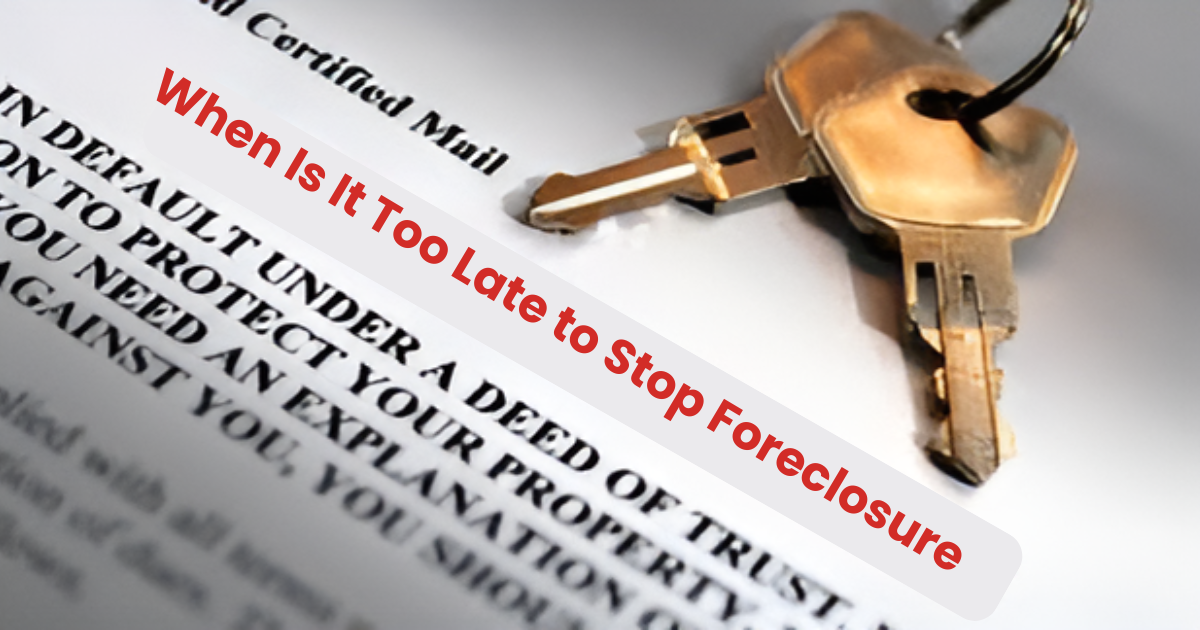Foreclosure is a legal process that occurs when a homeowner fails to make mortgage payments, leading the lender to seize and sell the property to recover the outstanding loan balance. This process begins with missed payments and can culminate in the sale of the property at a public auction. The impact of foreclosure extends beyond just losing one’s home; it affects credit scores, financial stability, and emotional well-being. Understanding foreclosure and its implications can help homeowners take timely action to prevent it or mitigate its effects.
When Is It Too Late to Stop Foreclosure is a crucial question for many homeowners facing this challenging situation. Timing is a critical factor in managing foreclosure. Early intervention can make the difference between keeping your home and losing it. The foreclosure process involves several stages, each with its own deadlines and opportunities for intervention. Recognizing these key milestones allows homeowners to take appropriate actions, such as negotiating with lenders or seeking legal advice. This guide will explore the stages of foreclosure and provide insights on when is it too late to stop foreclosure, emphasizing the importance of acting swiftly.
Understanding the Foreclosure Process
Initial Signs of Trouble
The early signs of foreclosure typically include missed mortgage payments and communication from the lender. Missing one or two payments might initially seem manageable, but if these issues persist, they can lead to more severe consequences. Homeowners should be vigilant about any notices or letters from their lender, as these documents often signal the start of formal foreclosure proceedings. Recognizing and addressing these signs early can prevent further complications and provide more options for resolution.
The Pre-Foreclosure Stage
The pre-foreclosure stage begins when the lender issues a Notice of Default (NOD), indicating that the borrower is behind on payments. This notice is a formal declaration that the lender intends to begin foreclosure proceedings unless the debt is paid or a satisfactory resolution is reached. Homeowners typically have a set period to respond to the NOD—usually a few months. During this time, they can negotiate with the lender, apply for loan modifications, or seek other forms of relief to prevent the foreclosure from progressing.
Foreclosure Filing and Legal Proceedings
If the borrower does not resolve the issue during the pre-foreclosure stage, the lender will file a foreclosure lawsuit. This step involves a Notice of Sale, which informs the homeowner of the scheduled auction date. The type of foreclosure—judicial or non-judicial—depends on state laws. Judicial foreclosure involves court proceedings, while non-judicial foreclosure does not. Understanding these legal proceedings and their implications is essential for homeowners seeking to halt the foreclosure process or explore their options.
The Auction Stage
At the foreclosure auction, the property is sold to the highest bidder. This stage is critical, as it represents the final opportunity to stop the foreclosure process before the home is sold. If the homeowner cannot bring the mortgage current or negotiate a last-minute resolution, they may lose their home to the highest bidder. However, some states offer a redemption period after the auction, during which the homeowner can reclaim the property by paying the auction price plus any additional fees.
When Is It Too Late to Stop Foreclosure?
Key Milestones Where Action Is Critical
Understanding when it is too late to stop foreclosure requires knowledge of key milestones in the process. Before the Notice of Sale, homeowners have the best chance of negotiating a resolution with their lender. During the redemption period, if applicable, there may still be an opportunity to stop the foreclosure by paying the required amount. However, once the auction is complete, it becomes significantly more challenging to reverse the process, although some states provide limited options for post-auction intervention.
Understanding State-Specific Deadlines
Foreclosure laws vary by state, affecting the timing and options available to homeowners. Some states have shorter timelines for each stage of foreclosure, while others offer longer periods for intervention. For instance, judicial foreclosure states typically involve more court proceedings, while non-judicial states may have quicker processes. Homeowners should be aware of their state’s specific deadlines and requirements to effectively navigate the foreclosure process and take timely action to prevent it.
Post-Auction Considerations
After the auction, the property is usually transferred to the highest bidder. At this stage, it is generally too late to stop the foreclosure. However, some states allow a redemption period during which the homeowner can reclaim the property by paying the auction price plus additional costs. This period varies by state and may offer a final opportunity to reverse the foreclosure. Homeowners should check their state’s laws to determine if a redemption period is available and what steps need to be taken to exercise this option.
Legal and Financial Options to Stop Foreclosure
Loan Modification
A loan modification involves changing the terms of the mortgage to make it more affordable for the homeowner. This could include extending the loan term, reducing the interest rate, or adding missed payments to the end of the loan. Applying for a loan modification early in the foreclosure process can prevent further escalation. Homeowners should contact their lender to explore this option and provide necessary documentation to support their request.
Refinancing Your Mortgage
Refinancing involves replacing the existing mortgage with a new one, often with better terms. This option can be beneficial if current interest rates are lower or if the homeowner has improved their financial situation since taking out the original loan. Refinancing can help make mortgage payments more manageable and prevent foreclosure. However, it is essential to act quickly and ensure that refinancing aligns with the homeowner’s long-term financial goals.
Filing for Bankruptcy
Filing for bankruptcy can provide temporary relief from foreclosure by halting legal proceedings through an automatic stay. This stay temporarily prevents creditors from taking further action, including foreclosure. Chapter 7 bankruptcy can discharge some debts, while Chapter 13 involves a repayment plan. Homeowners should consult with a bankruptcy attorney to determine which type of bankruptcy is appropriate for their situation and understand the implications for their foreclosure case.
Short Sale as an Alternative
A short sale involves selling the property for less than the outstanding mortgage balance with the lender’s approval. This option can be beneficial if the homeowner cannot afford the mortgage but wishes to avoid foreclosure. The lender must agree to accept less than what is owed, and the process can take time. Homeowners should work with a real estate agent experienced in short sales and ensure they meet all requirements to complete the sale.
Also Read: Low Water Pressure in Kitchen Sink
Deed in Lieu of Foreclosure
A deed in lieu of foreclosure involves transferring ownership of the property to the lender in exchange for canceling the mortgage debt. This option can help homeowners avoid the foreclosure process and its associated impacts on credit scores. While it may be less damaging than foreclosure, it still affects the homeowner’s credit. Homeowners should discuss this option with their lender and consider the long-term effects on their financial situation.
Working with Professionals
The Role of a Foreclosure Attorney
A foreclosure attorney specializes in defending homeowners against foreclosure and negotiating with lenders. Legal counsel can help homeowners understand their rights, explore available options, and develop a strategy to address the foreclosure. Seeking legal advice early in the process can provide valuable guidance and increase the chances of successfully stopping foreclosure or finding an alternative resolution.
Housing Counselors and Non-Profit Organizations
Housing counselors and non-profit organizations offer assistance to homeowners facing foreclosure. These professionals can provide guidance on budgeting, negotiating with lenders, and accessing available resources. Many organizations offer free or low-cost services, making them a valuable resource for homeowners struggling with foreclosure. Seeking help from these organizations can provide support and increase the chances of finding a solution.
Negotiating with Lenders
Negotiating with lenders is a critical step in stopping foreclosure. Homeowners should communicate openly with their lender, explain their financial situation, and propose potential solutions such as loan modifications or repayment plans. Understanding when is it too late to stop foreclosure is essential for timing these negotiations effectively. Effective negotiation can lead to favorable terms and prevent foreclosure. Homeowners should be prepared with financial documentation and a clear plan to present during negotiations. By addressing these issues early, homeowners increase their chances of finding a viable solution before it becomes too late to stop foreclosure.
The Emotional Impact of Foreclosure
Coping with Stress and Anxiety
Foreclosure can be a highly stressful and emotional experience, impacting mental health and well-being. Homeowners facing foreclosure should seek support from family, friends, or mental health professionals to manage stress and anxiety. Developing coping strategies, such as mindfulness or counseling, can help individuals navigate this challenging period and maintain emotional stability.
The Long-Term Consequences of Foreclosure
The long-term consequences of foreclosure include damage to credit scores, difficulty obtaining future loans, and potential emotional and financial challenges. Rebuilding credit and financial stability after foreclosure requires time and effort. Homeowners should focus on creating a plan for financial recovery, including improving credit scores, budgeting, and exploring opportunities for future homeownership.
Preventing Foreclosure in the Future
Creating a Financial Safety Net
Establishing a financial safety net is essential for preventing future foreclosure. Homeowners should prioritize building an emergency savings fund to cover unexpected expenses and ensure they can meet mortgage payments. Effective budgeting and financial planning can also help manage expenses and reduce the risk of falling behind on mortgage payments.
Staying in Communication with Your Lender
Maintaining open communication with your lender is crucial for preventing foreclosure. Homeowners should inform their lender of any financial difficulties as soon as possible and discuss potential solutions. Regular communication can help address issues early and provide opportunities for negotiating alternative arrangements.
Exploring Government Assistance Programs
Government assistance programs offer support for homeowners facing foreclosure. These programs may provide financial aid, counseling, or other resources to help manage mortgage payments and avoid foreclosure. Homeowners should research available programs, determine eligibility, and apply for assistance as needed.
Conclusion
Understanding when is it too late to stop foreclosure involves recognizing key milestones in the foreclosure process and knowing your options. Acting early, exploring available alternatives, and seeking professional help can increase the chances of preventing foreclosure. Homeowners should stay informed about their rights and take timely action to address financial challenges.
Facing foreclosure can be overwhelming, but there are options and resources available to help. Homeowners should remain proactive, seek assistance from professionals, and explore all available solutions. By taking decisive action and utilizing available resources, homeowners can work towards a positive resolution and protect their financial future.
FAQs
Can You Stop Foreclosure After Receiving a Notice of Sale?
Yes, you may still have options to stop foreclosure after receiving a Notice of Sale. Some states offer a redemption period during which you can reclaim the property by paying the auction price plus additional costs. However, the opportunities to intervene are limited, so it is crucial to act quickly.
What Are the Best Options to Avoid Foreclosure?
The best options to avoid foreclosure include applying for a loan modification, refinancing your mortgage, filing for bankruptcy, pursuing a short sale, or offering a deed in lieu of foreclosure. Each option has its advantages and considerations, so it is important to choose the one that best fits your financial situation.
How Does Foreclosure Affect Your Credit Score?
Foreclosure has a significant negative impact on your credit score, often causing it to drop by 100 points or more. This damage can affect your ability to obtain future credit and may remain on your credit report for up to seven years. Rebuilding your credit after foreclosure requires time and consistent financial management.
Is It Possible to Reverse Foreclosure After the Auction?
Reversing foreclosure after the auction is generally challenging but may be possible in some states during a redemption period. During this period, you can reclaim the property by paying the auction price and additional fees. It is essential to check your state’s specific laws and deadlines to determine if this option is available.
What Should You Do if You Can’t Afford an Attorney?
If you cannot afford an attorney, consider seeking assistance from housing counselors or non-profit organizations that offer free or low-cost services. These professionals can provide guidance, help you understand your options, and assist with negotiations. Additionally, some legal aid organizations offer pro bono services for eligible individuals.










